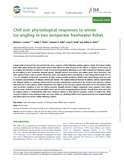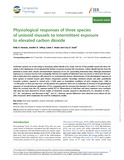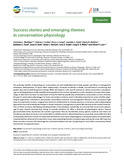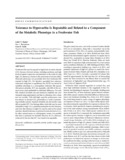Browsing by Author "Suski, Cory D."
Now showing items 1-4 of 4
-
Chill out: physiological responses to winter ice-angling in two temperate freshwater fishes
Louison, Michael J.; Hasler, Caleb T.; Raby, Graham D.; Suski, Cory D.; Stein, Jeffrey A. (Society for Experimental Biology, 2017-04-17)A large body of research has documented the stress response of fish following angling capture. Nearly all of these studies have taken place during the open-water season, with almost no work focused on the effects of capture ... -
Physiological responses of three species of unionid mussels to intermittent exposure to elevated carbon dioxide
Hanna, Kelly D.; Jeffrey, Jennifer D.; Hasler, Caleb T.; Suski, Cory D. (Society for Experimental Biology, 2016-12-29)Freshwater systems are at risk owing to increasing carbon dioxide (CO2) levels, and one of the possible reasons for these elevations is the deployment of non-physical fish barriers to prevent invasive fish movements. Carbon ... -
Success stories and emerging themes in conservation physiology
Madliger, Christine L.; Cooke, Steven J.; Crespi, Erica J.; Funk, Jennifer L.; Hultine, Kevin R.; Hunt, Kathleen E.; Rohr, Jason R.; Sinclair, Brent J.; Suski, Cory D.; Willis, Craig K. R.; Love, Oliver P. (Oxford University Press and the Society for Experimental Biology, 2016)The potential benefits of physiology for conservation are well established and include greater specificity of management techniques, determination of cause–effect relationships, increased sensitivity of health and disturbance ... -
Tolerance to Hypercarbia Is Repeatable and Related to a Component of the Metabolic Phenotype in a Freshwater Fish
Hasler, Caleb T.; Bouyoucos, Ian A.; Suski, Cory D. (The University of Chicago, 2017-07-14)Freshwater fish may be exposed to high levels of carbon dioxide (CO2) because of several actions, including anesthesia and high levels of aquatic respiration and potentially as the result of using high-CO2 plumes as a ...




